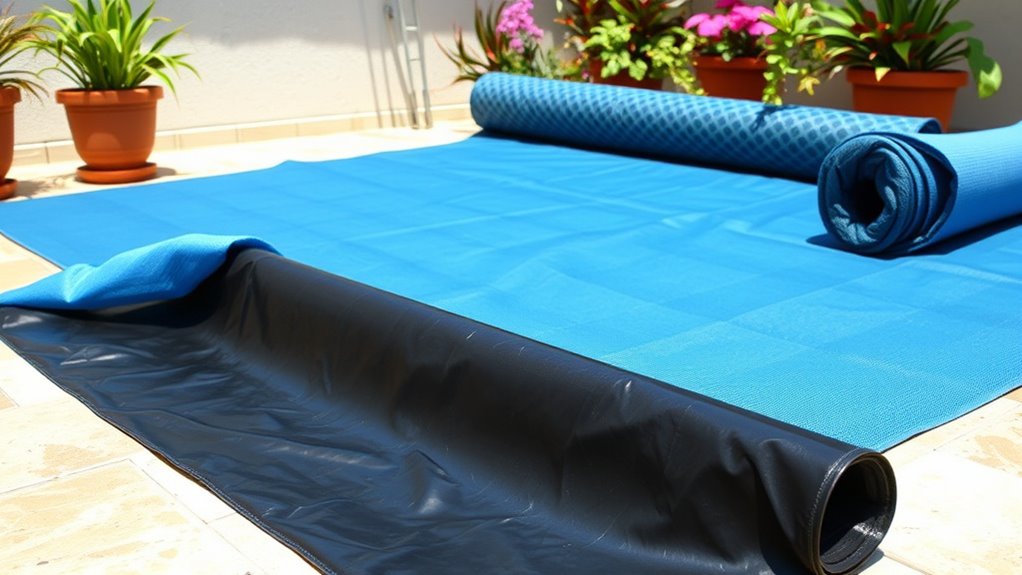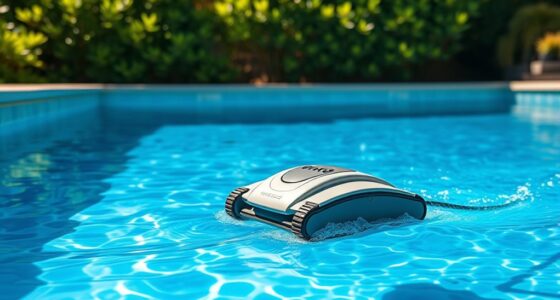When it comes to pool covers, you’ve got several types to choose from, each serving its unique function. Solar covers warm your pool and reduce evaporation. Winter covers keep debris out and limit algae growth. Safety covers protect against accidental drowning and meet safety standards. Mesh covers let rain through while blocking larger debris. Solid and automatic covers offer insulation and convenience, though the latter comes with a higher price tag. Stay with us to discover more insights on pool covers!
Key Takeaways
- Solar pool covers warm water, reduce evaporation, and extend the swimming season by capturing sunlight effectively.
- Winter pool covers protect pools from debris, reduce maintenance, and limit algae growth during off-seasons.
- Safety pool covers serve as barriers against accidental drowning and meet national safety standards for enhanced protection.
- Mesh pool covers allow rainwater to drain while blocking larger debris, offering a cost-effective and low-maintenance solution.
- Solid vinyl and automatic covers provide excellent insulation, block sunlight to prevent algae, and offer strong protection against debris.

When it comes to maintaining your pool, choosing the right cover can make all the difference. You’ve got several options, each designed for specific functions that can enhance your pool experience.
Solar pool covers are a popular choice if you’re looking to extend your swimming season. They capture sunlight, increasing water temperature while reducing evaporation. Lightweight and easy to handle, these covers are a practical and economical way to keep your pool warm and save on chemicals.
Solar pool covers effectively extend your swimming season by harnessing sunlight to warm water and minimize evaporation.
As winter approaches, you’ll want to take into account winter pool covers. These covers are built to withstand harsh conditions, preventing debris from cluttering your pool and reducing the maintenance required during the off-season. Typically made from durable materials, winter covers come in mesh or solid styles, offering varying degrees of protection. By keeping your pool covered, you also limit algae growth, ensuring a smoother opening come spring.
If safety is a priority, safety pool covers should be at the top of your list. They provide an essential barrier against accidental drowning, meeting national safety standards. Available in solid, mesh, and automatic types, these covers are made from strong materials that cater to your specific needs. By investing in a safety cover, you not only protect your loved ones but also considerably reduce liability.
Mesh pool covers are another option worth taking into account. They allow rainwater to pass through, preventing water accumulation while blocking larger debris. Although they don’t retain heat as well as solid covers, mesh options are often more cost-effective and easier to install and remove. They require less maintenance compared to solid covers, making them a practical choice for many pool owners.
Solid vinyl covers, on the other hand, completely block sunlight and help prevent algae growth. They provide excellent insulation and heat retention, keeping your pool water warmer. However, they require more maintenance, as they can accumulate water that needs to be pumped off regularly.
For ultimate convenience, automatic pool covers are hard to beat. With just the push of a button, you can open or close your cover, saving you time and effort. They offer strong protection against debris and enhance safety, making them a worthwhile investment despite a higher initial cost.
Lastly, foam pool covers are lightweight and designed primarily for insulation. While they provide a barrier against debris, they may not be as durable as other options. They’re best suited for short-term solutions, particularly during colder months to reduce heating costs.
Choosing the right cover for your pool can enhance its longevity, safety, and your enjoyment, so evaluate your needs before making a decision.
Frequently Asked Questions
How Do I Choose the Right Pool Cover for My Needs?
To choose the right pool cover, start by measuring your pool’s dimensions accurately.
Consider your local climate: if it’s colder, opt for thermal covers; if warmer, solar covers might be best.
Think about safety, especially if kids or pets are around; a heavy-duty cover can provide peace of mind.
Finally, weigh your budget against convenience—automatic covers offer ease, while manual ones are more affordable but may require more effort.
Can I Install a Pool Cover Myself?
Installing a pool cover yourself can feel intimidating, like jumping into cold water on a hot day. But it’s totally doable!
With a few essential tools and some patience, you can tackle this DIY project in just a few hours. Just remember to remove ladders, center the cover, and drill carefully to avoid deck damage.
Following the manufacturer’s instructions will help guarantee a smooth installation and keep your pool safe and secure.
What Maintenance Is Required for Different Pool Covers?
To maintain your pool covers, you’ll need to follow specific routines based on the type.
Remove debris and water regularly, inspect mechanisms for wear, and apply lubricant where necessary.
For solid covers, guarantee proper drainage and check for damage.
With mesh covers, rinse frequently and inspect straps.
If you’ve got a solar cover, clean it gently and store it properly.
Always address any repairs promptly to keep everything in top shape!
Are Pool Covers Safe for Children and Pets?
Yes, pool covers can be safe for children and pets, greatly reducing the risk of accidental drowning.
They provide a barrier that prevents unauthorized access to the pool area.
However, it’s crucial to choose covers that meet safety standards and are designed to support weight.
Regular maintenance is key, ensuring that the covers remain secure and effective.
Always supervise kids and pets around the pool, even with a cover in place.
How Much Do Pool Covers Typically Cost?
Did you know that automatic pool covers can cost anywhere from $7,000 to $25,000?
When you’re considering a pool cover, the price varies widely based on material, size, and features.
Manual covers are generally more affordable, ranging from $500 to $5,000.
Safety covers typically fall between $1,200 and $3,600, while solar covers are quite budget-friendly, costing just $30 to $150.
It’s crucial to weigh safety and functionality against your budget.
Conclusion
In conclusion, choosing the right pool cover can enhance your experience, protect your investment, and simplify maintenance. Whether you opt for a safety cover, a solar cover, or a winter cover, each type serves a unique purpose. They keep debris out, they conserve heat, and they guarantee safety for loved ones. So, take the time to find a cover that fits your needs—it’ll make a world of difference in how you enjoy your pool!









